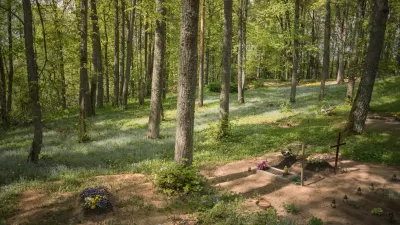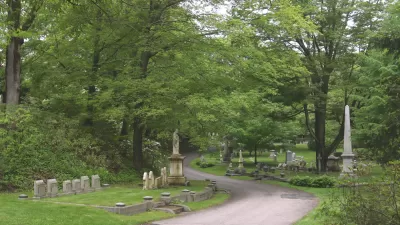The practice, which is gaining popularity as an environmentally friendly alternative to embalming and cremation, is in line with traditional Jewish and Muslim funeral practices.

The state of Minnesota passed a law barring new cemeteries from offering ‘green’ burial for two years. Green or natural burial eliminates the use of toxic embalming chemicals, concrete vaults, and steel-lined caskets in favor of burial using natural materials such as wood and linen. As Walker Orenstein explains in MinnPost, proponents say the practice is better for the environment, prevents chemicals from leaching into the ground, and leads to faster, more natural decomposition. The ban will not apply to cemeteries already using the practice.
The moratorium was passed as a response to unfounded concerns that burying bodies at a shallower depth than the traditional six feet could pollute water or lead to bodies dug up by wildlife. However, thousands of cemeteries around the country and the world—including traditional Jewish and Muslim graveyards, not to mention every American cemetery prior to the Civil War—perform natural burials with no problems.
The law, which was aimed at a proposed new green cemetery, also comes into conflict with religious freedom. “Could Minnesota’s green burial law potentially block new Islamic and Jewish cemeteries for two years? And did Minnesota lawmakers consider that when passing the moratorium?” Kyle Anderson, funeral director and cemetery manager for the Minnesota Islamic Cemetery Association, says “there will be a need eventually for more cemeteries serving Muslims in the area, since Garden of Eden, which he estimates handles more than 90% of burials for Muslims in the Twin Cities, will be full in as soon as a decade.”

Maui's Vacation Rental Debate Turns Ugly
Verbal attacks, misinformation campaigns and fistfights plague a high-stakes debate to convert thousands of vacation rentals into long-term housing.

Planetizen Federal Action Tracker
A weekly monitor of how Trump’s orders and actions are impacting planners and planning in America.

San Francisco Suspends Traffic Calming Amidst Record Deaths
Citing “a challenging fiscal landscape,” the city will cease the program on the heels of 42 traffic deaths, including 24 pedestrians.

Adaptive Reuse Will Create Housing in a Suburban Texas Strip Mall
A developer is reimagining a strip mall property as a mixed-use complex with housing and retail.

Study: Anti-Homelessness Laws Don’t Work
Research shows that punitive measures that criminalized unhoused people don’t help reduce homelessness.

In U.S., Urban Gondolas Face Uphill Battle
Cities in Latin America and Europe have embraced aerial transitways — AKA gondolas — as sustainable, convenient urban transport, especially in tricky geographies. American cities have yet to catch up.
Urban Design for Planners 1: Software Tools
This six-course series explores essential urban design concepts using open source software and equips planners with the tools they need to participate fully in the urban design process.
Planning for Universal Design
Learn the tools for implementing Universal Design in planning regulations.
Heyer Gruel & Associates PA
JM Goldson LLC
Custer County Colorado
City of Camden Redevelopment Agency
City of Astoria
Transportation Research & Education Center (TREC) at Portland State University
Jefferson Parish Government
Camden Redevelopment Agency
City of Claremont





























